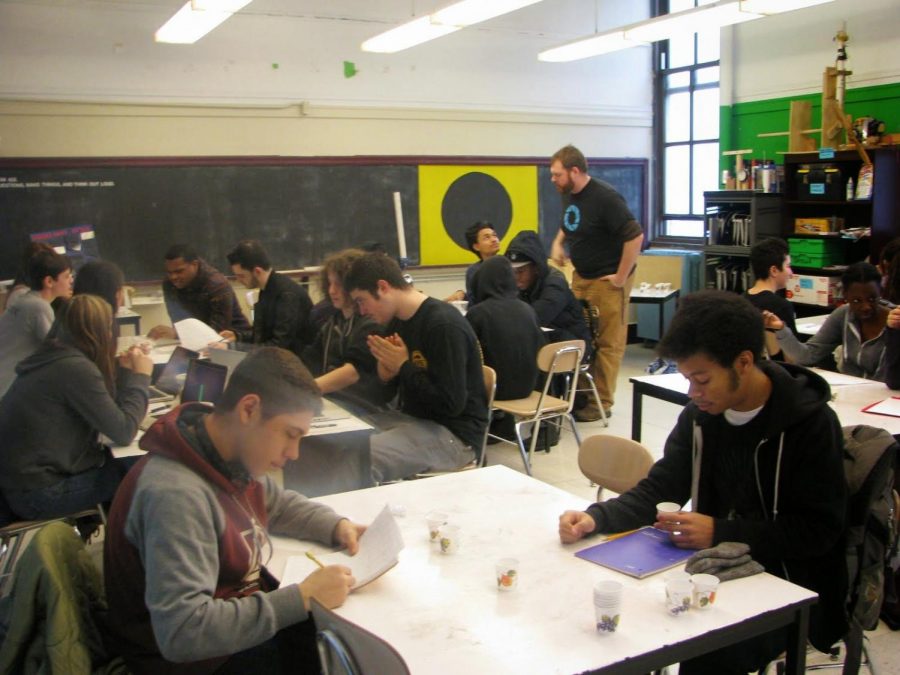iSchoolers react to going fully mastery
Students at the iSchool work diligently to complete an assignment given to them by their teacher. The teacher monitors their progress. Photo Credit: https://insideschools.org/school/02M376
October 22, 2021
School itself is stressful without taking assignments into consideration. An average day for a high school student starts off with waking up at an ungodly time and commuting to school where they spend six hours before returning back to their home. Once they come home, there is very little time to rest before they are forced to begin their assignments. And before you know it, this cycle is playing over and over again, causing people to lose motivation. But what if I told you, the iSchool has eliminated most of this stress.
The NYC iSchool’s grading policy is an interesting one, where students show mastery in the subjects that they are taking. This policy allows parents and caretakers to be connected to student learning while allowing students to learn better, rather than be so focused on what grade they end up getting. The policy attempts to combat the stress aspect that comes with grades by redirecting student’s focuses from what grade they get to how well they’ve mastered a certain topic.
The iSchool’s policy used to consist of both productivity and mastery; productivity included small homework assignments that were worth 25% of your final grade. Mastery on the other hand, refers to assignments such as tests and projects that were worth 75% of your grade, and these assignments could be retaken to show higher mastery.
Now, with iSchool completely eliminating the productivity part of their grading policy, mastery is now worth 100% of a student’s grade. This may be seen as stressful for some, while others may jump for joy at the chance to redo all assignments they submit. But, we can all agree that everyone feels a different way about this new change, and rightfully so.
When asked about his opinions on the iSchool’s newest edit on the mastery approach, junior Mario Ilievski. In fact, many students share similar feelings to Mario on this transition to having productivity and now without it. While productivity is still assigned in most classes and checked from time to time, there is no grade component that forces students to actually get this work done. expressed, “I think productivity kind of forces you to do your work and it also keeps track of if you’re doing it right. With the new mastery policy, indirectly it tells you to do your work but it doesn’t really have an impact on your grade as it should.”
For some, not having a grade initiative isn’t much of a problem, but there are a handful of students who may feel there is no use in completing this work. Consequently, choosing not to complete the productivity assignments can lead to lower performance on mastery assignments.
Moreover, those who have just now adapted to iSchool’s unique policy may feel confused towards the changes being made. While last year most people had both productivity and mastery be assessed in their grades, this is no longer the case. “It has been quite a shift in terms of what they are focusing on as students come from an understanding where they have to get their grade up. Now, their understanding has been shifted,” Ms. Figueroa comments.
Many iSchooler’s may share this similar idea, in which coming to iSchool has shifted their focus academically. As iSchool’s section of the Mastery Collaborative’s website states, “Our school wide grading policy is rooted in the belief that demonstrating mastery of skills and standards is the most important part of a course.” Furthermore, Mastery Collaborative’s mindset on this policy is crucial, “Grades are neither rewards nor punishments. Instead, a grade is a message about where the learner is at a point in time, along the path to mastery.”
The NYC iSchool emphasizes the importance of making school a better place for everyone, not just those who are able to succeed easily academically. The teachers at iSchool are ones who are genuinely invested in student learning and want their students to do well not just in school, but in general.
Senior at the iSchool, Nealy Simms shares her experience with the teachers at iSchool explaining, “The teachers are always willing to sit with you, work through the problems, work with you to make sure that you get to a point of remembering, you get to a point of holding that knowledge in your mind and not letting it go in one ear and out the other.”
Lucky for us, we are able to attend a school where students’ learning is a top priority. And with the administration always wanting to improve the way we learn, it is understandable to see how we arrived at a system that has completely gotten rid of productivity. For many students, handling productivity along with mastery wasn’t the easiest endeavor, not wanting to sacrifice one aspect of their grade to focus on another. While having to balance the work between productivity and mastery, many share experiences of not knowing how to find an even time distribution between the two.
“It’s a bit early to tell. Last year was a different protocol, it was a lot to deal with having homework and mastery. It’s hard always thinking about how much a homework assignment will impact your grade while you have other things to worry about. So in that aspect, productivity being eliminated also eliminates the stress that comes with it,” sophomore Nikki Hatzopoulos adds.
Going back to the stress component that follows with any mention of school, it seems that with this new alteration of the mastery grading policy, iSchool has put these ideas into mind in order to ease the lives of their students. With this, students are able to focus their attention back to actually mastering the material rather than worrying about the piles of homework they need to work on.
It’s great to see how the NYC iSchool has tried to simplify the lives of their students and shows that they’re always listening. Mathematics teacher and Dean, Mr.Whittaker shares his experience adding, “Looking at my last school to when I came here, the joy in learning is a bit more pure. There’s a little bit more pursuit of knowledge in this system instead of the pursuit of merit.”
The iSchool has had progressive mindset since day one has transferred to the students, making them more engaged and happier with their learning. After all, school shouldn’t just be a place where students come to focus on a numeric value, and the iSchool has continued employing this mindset by improving the way students are assessed on their learning.
“I think we’re doing a great job and we’re all trying to get there but I don’t think there ever exists. We’re always growing too somewhere growing as teachers as you’re growing as students. I don’t think for something like this, there ever is a there,” Mr. Whittaker mentions. “In general, your life everyday is trying to do something and if you don’t do well, the next day you do better. This structure is a reflection of how you grow as a student.”



